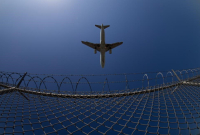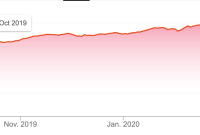Support strong Canadian climate journalism for 2025
How can we help and support the people whose work puts them at risk for COVID-19 — not just healthcare workers, but folks who are still going to work everyday as grocery clerks or delivery people or bus drivers?
I’ve been thinking about this a lot, because I’m conscious that for people in those roles, as well as people who live in tiny spaces and/or on low incomes, social distancing is a tall order. The ability to work from home correlates with all kinds of social and class privilege; the ability to tolerate a housebound existence depends on your home and situation; the opportunity to grocery shop for one or two weeks at a time depends on cashflow.
When it comes to putting social distancing into practice, our family is privileged in every way. My husband and I already worked from home, and already homeschooled one of our kids; only one member of our family finds themselves newly homebound. We have every kind of device and gadget you might need in order to stay happy and productive inside this house, and you might argue that we’ve been in training for this moment for the past fifteen years, since we mostly spent our time online and at home, anyhow. Most of all, we have the money and time for things like stocking up on groceries, disinfecting all incoming packages and purchases, and coming up with a way to measure the 6-foot distance I need to keep with my walking buddy. We’ve been able to effectively seal off all social contact with minimal consequences.
We haven’t gone to these extremes because we are especially worried about getting COVID-19 ourselves; nobody in our home is immune compromised, and at the moment, we’re not even seeing my (very healthy) 81-year-old mother. We’re doing this as an expression of citizenship and solidarity, so that we don’t run the risk of spreading the virus, or of getting sick ourselves and taxing an already overloaded system.
My feeling is that privileged homebodies like us have a duty to undertake social distancing with this kind of rigor, precisely so that healthcare resources are available for people who are going to have a much harder time avoiding exposure. I don’t want the lovely grocery clerk at the IGA to go without an ICU bed or ventilator just because dumb f*&*ers like me can’t skip a haircut, or because newly remote workers are still making face-to-face dates with two or three friends. (That’s all it takes to break the logic of social distancing and set the whole chain of transmission going again! )
But what if we made that logic into policy? This week the New England Journal of Medicine published an article on allocating scarce resources during a pandemic. Among other guidelines, it recommends that healthcare workers should receive priority treatment, because we need them back on their feet in order to keep the system running for everyone. The article also suggests that, all things equal between two patients, people who have volunteered for COVID research should receive priority for treatment — as a way to reward and motivate research participation.
I wonder if the same logic should be extended to other front-line workers. Once you’ve looked after the healthcare workers, perhaps we should also prioritize other first responders (police and fire), but after that, we need to look at prioritizing the new front-line workers who have had to (or have chosen to) keep working while the rest of us go into retreat.
If two people have equal risks and prognoses, and are similar ages, I’d suggest that the grocery clerk who’s sick should be prioritized over the writer or lawyer or university student who just didn’t make an effort. This is the kind of guideline that the Public Health Agency of Canada could build into ethical guidelines, equivalent to the patient prioritization guidance built into its resource allocation guidelines for pandemic influenza.
This would have three big benefits, if publicized:
- Encourage privileged people who can distance to make the maximum effort, because we know we’ll be at the back of the line,
- Provide some comfort, encouragement and appreciation to front line workers in transportation, essential retail et cetera, who are in a very scary and stressful situation, and,
- At least slightly mitigate the really terrible class and race dynamics of this crisis, in which poor people and people of color are going to be sick and dying at higher rates for all kinds of reasons.
I know that the idea of stepping to the back of the line might feel very uncomfortable for the kinds of privileged folk who donate to political campaigns or run tech companies or run their own small businesses. I know that saying you’ll step to the back of the line is easy….until the moment when you’re in that hospital waiting room, wondering if you’ll get the last available ICU bed. And I know that our society needs lawyers and engineers and accountants, and that those professional credentials represent years of social investment in education as well as personal effort.
But what this crisis has made abundantly clear is that our society is also desperately, vitally dependent on front-line and low-skill workers who are too often devalued and marginalized in our economy, our communities and our culture. Every time you make that scary weekly grocery trip — then run home to wash your hands, along with every package you’ve purchased — you’re making a brief journey into the day-by-day, hour-by-hour, lived experience of people who are putting their lives at risk while the rest of us cocoon safely at home. We can all show how much we appreciate their courage and their consistency by committing to resource allocation guidelines that — for once! — put working people first.








Comments
It'd probably be helpful if people of the class being called upon in this article just stopped overusing the health system when they don't need it.
It's not actually "the elderly" or "the poor" or those "in poor health" who use up, per person, the most in health care resources: it's the same lawyers, accountants, etc.
St. Mikes did a study on that. Not long ago.
And if those same people would stop voting for politicians who promise them ever fewer taxes, at the expense of all those people who scramble for every penny, and usually come up short at the end of the month. And if they'd pay more attention to the country's carbon budget than the bottom line of their current investment portfolio.
Those would be actually meaningful considerations.
The rest is more self-congratulatory and virtue-signalling than anything else, because we all know darned well who'd be allocated the ventilator. And no one who couldn't breathe would say, "Oh, no thanks. Give it to someone else instead." Not in the reality.